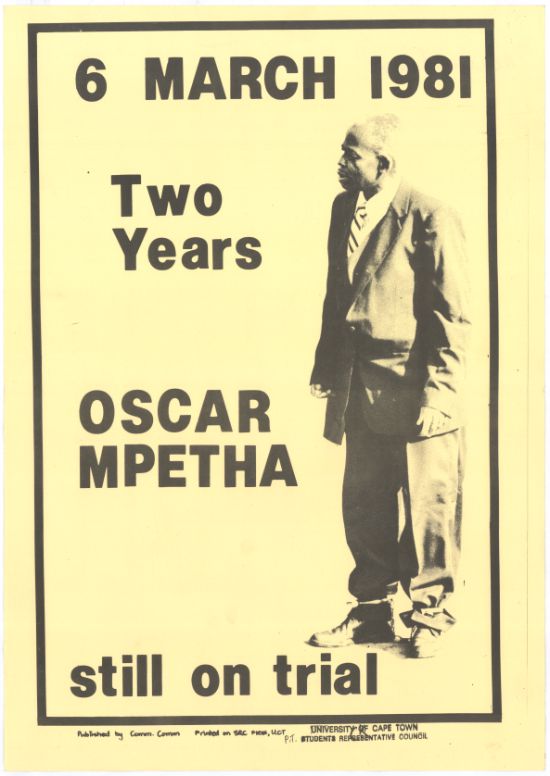 "Let us remember them in the way they would have wished - by rededicating our movement to the struggle for the liberation of humankind..."
"Let us remember them in the way they would have wished - by rededicating our movement to the struggle for the liberation of humankind..."
- Zwelinzima Vavi, East London, 30 April 2010
Oscar Mpetha's involvement as a trade unionist and political leader in the African Food and Canning Workers' Union (AFCWU) in late 1940s and early 1950s propelled him into leadership positions in both the South African Congress of Trade Unions (SACTU) and the Cape African National Congress (ANC).
Mpetha was born in the Transkei in 1909, and after being schooled at Adams College in Natal, he joined the ranks of migrant workers seeking work in Cape Town. By the mid-1940s, he had taken on an active leadership role in the AFCWU, recruiting many workers in fish canning factories situated along the West Coast. He was soon elected as general secretary of the AFCWU, and became a member of the ANC in 1952. In 1955, he formed part of a union delegation that reviled against the exclusionary racial policies of the newly formed Trade Union Council of South Africa (TUCSA), and formed the first non-racial trade union body in South Africa, the South African Congress of Trade Unions (SACTU).
Between 1958 and 1960, Mpetha led the Cape ANC, until it was banned. He was detained, and subsequently banned, until the late 1970s. After his banning order lapsed, he assisted in the successful Fatti's and Moni's strike of 1978. By 1981, Mpetha was recognized as a threat to the apartheid regime, especially after he issued a statement condemning the role of the police in a fatal incident involving protesters that had taken place in August 1980. For this, he was eventually convicted of terrorism, and despite being released on bail pending an appeal, he was re-arrested in 1985 and held in Groote Schuur Hospital. He suffered from partial blindness, lung problems, kidney problems, and, in particular, diabetes, which resulted in the amputation of both his legs. He was finally released in 1989, and despite his poor health, he took on an active role in the lead-up to the first democratic election in 1994. His political aspirations were thus realized shortly before his death in November 1994.
SAHA collections: trade unions
SAHA has numerous archival collections that contain the materials either created or collected by particular trade unions, or images of various trade union activities, particularly from the 1980s.
Learn more about SAHA's collection of trade union-related material.
Between life and death: stories from John Vorster Square
Throughout his life, Oscar Mpetha was detained by South African state security police. SAHA has developed an interactive product that contains interviews with ex-detainees of John Vorster Square, otherwise known as the 'pinnacle of torture chambers.'
Learn more about this product.






 "Let us remember them in the way they would have wished - by rededicating our movement to the struggle for the liberation of humankind..."
"Let us remember them in the way they would have wished - by rededicating our movement to the struggle for the liberation of humankind..."